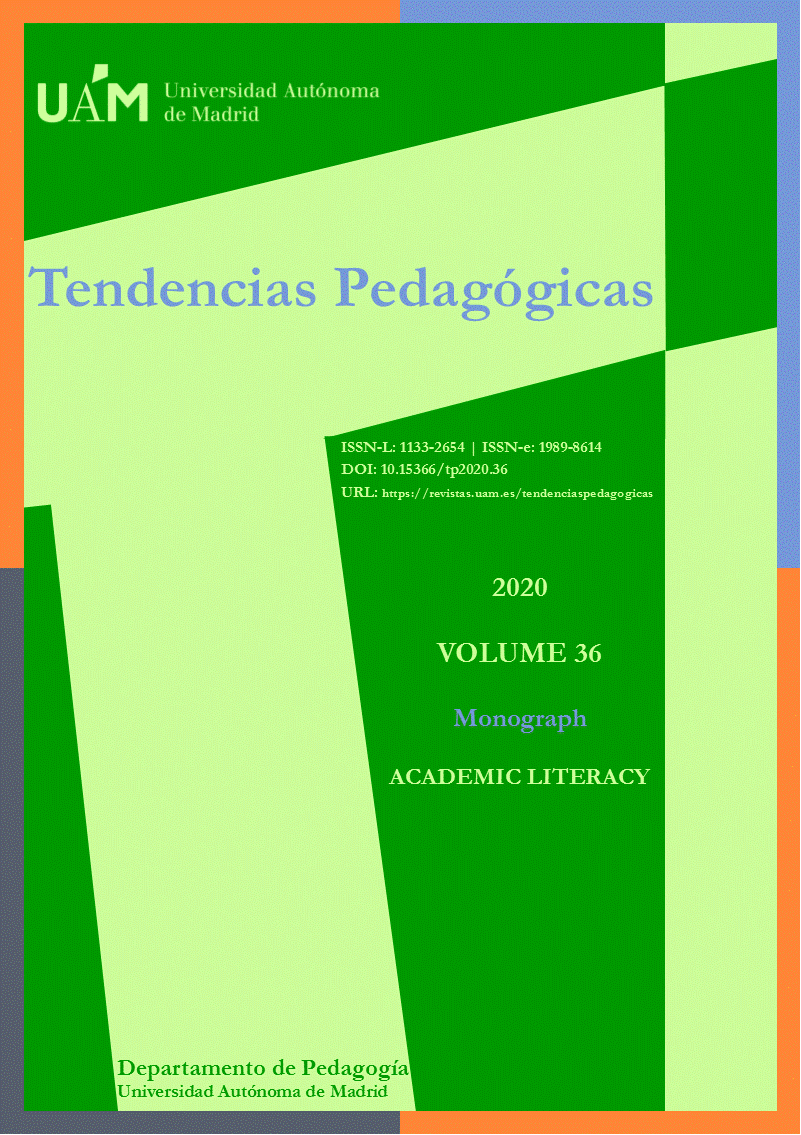Undergraduate dissertations in Spanish and English: challenges of, and an attempt to improve, academic literacy in initial teacher education
Keywords:
academic literacy, intertextuality, teacher education, genre pedagogy, reading to learn
This work is licensed under a Creative Commons Attribution-NonCommercial 4.0 International License.
Abstract
In this paper we explore the process of undergraduate dissertation writing in Spanish, and in English as a second language, by students of Education, and the development of academic literacy that this entails. To this end, analyses are done both on initial drafts, on which supervisors provided guidance, and on final versions of six dissertation texts written by students of Education specialising in Early Years or in Primary Education —with English as a Foreign Language. The difficulties identified do not correspond to the expectation that the process should be more complex if the work is written in a foreign language rather than in the students’ mother tongue. Rather, they seem to arise from the lack of explicit knowledge of the relevant genres. We then report on two academic writing workshops, one in English and the other in Spanish, developed by faculty members to support students in the composition process of each section of the dissertation, based on Rose & Martin’s (2012) “Reading to Learn” pedagogy, an evidenced-based approach to improving academic literacy through genre pedagogy. We conclude with an overview of the students’ views of the workshops in terms of 1) their usefulness; 2) how effective the approach used in the sessions was; and 3) the degree of preparation and confidence they felt they had reached upon completion of the workshop sessions.
Downloads
References
Amor Almedina, M. I., & Serrano Rodríguez, R. (Coords.). 2017. Guía práctica para el trabajo de fin de grado en Educación. Barcelona: Graó.
BOUC, Boletín Oficial de la Universidad Complutense, Disposiciones y acuerdos de los órganos de gobierno de la Universidad Complutense, 8, de 30 de julio de 2012, pp. 1-34. Recuperado de https://bouc.ucm.es/completos/2012/8.pdf
Consejo de Europa. (2002). Marco común europeo de referencia para las lenguas: aprendizaje, enseñanza, eva-luación. Instituto Cervantes y Anaya. Recuperado de https://cvc.cervantes.es/ensenanza/biblioteca_ele/marco/cvc_mer.pdf
Da Cuhna, I. (2016). El trabajo de fin de grado y de máster. Redacción, defensa y publicación. Barcelona: Editorial UOC.
Eggins, S. (2004). An Introduction to Systemic Functional Linguistics. Nueva York & London: Conti-nuum.
Facultad de Educación-Centro de Formación del Profesorado de la Universidad Complutense de Madrid. (2018). Guía del Trabajo de Fin de Grado en Maestro en Educación Infantil Curso 2018-2019. Recuperado de: https://educacion.ucm.es/data/cont/docs/24-2018-11-20-GUIA_TFGinfan_18-19.pdf
Facultad de Educación-Centro de Formación del Profesorado de la Universidad Complutense de Madrid. (2018). Guía de Trabajo de Grado en Maestro en Educación Primaria Curso 2018-2019. Recuperado de https://educacion.ucm.es/data/cont/docs/24-2018-11-13-Guia_TFG_Primaria_18-19.pdf
García Parejo, I., & Whittaker, R. (Coords.) (2017). Sección monográfica: Teoría y práctica del mo-delo Reading to Learn (Leer para aprender) en contextos educativos transnacionales. Lenguaje y Textos 46, pp. 1-89.
Gardner, T. (2008). Designing Writing Assignments. National Council of Teachers of En-glish. Recuperado de: https://wac.colostate.edu/books/gardner/.
Howard, R. M. (2007). Understanding “Internet plagiarism”. Computers and Composition, 24, pp. 3-16. doi: 10.1016/j.compcom.2006.12.005
Li, Y., & Casanave, C. P. (2012). Two first-year students’ strategies for writing from sources: Patchwriting or plagiarism? Journal of Second Language Writing, 21(2), pp. 165-180. doi: 10.1016/j.jslw.2012.03.002
Martin, J. (1984). Language, Register and Genre. In F. Christie (ed.) Children Writing: a Reader. Gee-long, Vic: Deakin University Press, pp. 21-29.
Martin, J. (1992). Macro-Genres: The Ecology of the Page. Sydney: Dept. of Linguistics, University of Sydney.
Real Decreto 1393/2007, de 29 de octubre, por el que se establece la ordenación de las enseñanzas universitarias oficiales. Boletín Oficial del Estado, 260, de 30 de octubre de 2007, 1 a 28. Recupera-do de: https://www.boe.es/buscar/pdf/2007/BOE-A-2007-18770-consolidado.pdf.
Real Decreto 861/2010, de 2 de julio, por el que se modifica el Real Decreto 1393/2007, de 29 de octubre, por el que se establece la ordenación de las enseñanzas universitarias oficiales. Boletín Oficial del Estado, 161, de 3 de julio de 2010, Sec. I 58454 a 58468. Recuperado de: https://www.boe.es/eli/es/rd/2010/07/02/861/dof/spa/pdf.
Regueiro Rodríguez, M. L., & Sáez Rivera, D. M. (2018). El español académico. Guía para la elaboración de textos académicos (3ª ed.). Madrid: Arco Libros.
Rose, D. (2010). Academic Reading and Writing in Reading to Learn, training resource package: course book 10. Sydney: Reading to Learn.
Rose, D., & Martin, J. (2018). Leer para aprender. Lectura y escritura en las áreas del currículo. Madrid: Pirámide.
Vázquez, G. (coord.) (2001). Guía del discurso académico escrito. ¿Cómo se escribe una monografía? Madrid: Edinumen.
Whittaker, R., & García Parejo, I. (2018). Teacher Learning for European Literacy Education (TeL4ELE): genre-based pedagogy in five European countries. European Journal of Applied Lin-guistics, 6(1), pp. 31–57. doi: 10.1515/eujal-2017-0021

